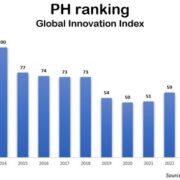For about two months now, the Philippine peso has been trading flat at around the 48-level against the US dollar and is seen to range between 48.00-49.00 for this year.
To date, the peso remains as one of the strongest currencies in the region as it continues to trade on its strongest in more than four years, Rizal Commercial Banking Corporation (RCBC) Chief Economist Michael Ricafort said.
“Relatively slower pick up/recovery in imports that results to narrower trade deficits of about USD1 billion-USD2 billion per month since the Covid-19 pandemic could still lead to relatively stronger peso exchange rate,” he told the Philippine News Agency.
The peso ended 2020 at 48.023, up by around 5.2% against the US dollar.
Further, Ricafort said the risk from the new Covid-19 variants makes the USD remains weak around the world which in turn is a plus for the local currency.
Among external factors, Ricafort noted was that the near-zero short-term US interest rates is benefiting emerging markets like the Philippines “as global funds search for higher returns amid near record low US/global bond yields/interest rates) that reduced demand for safe haven such as the US dollar.”
Ricafort emphasized that the peso is expected to further strengthen with the timely approval of this year’s national budget, the one-year extension for utilization of the remaining 2020 national budget, the six-month extension of the Bayanihan 2 Law appropriation to end-June 2021, as well as the progress of several pending bills in Congress like the Corporate Recovery and Tax Incentives for Enterprises (CREATE) Act and the Financial Institutions Strategic Transfer (FIST) bill.
Added pluses for the peso are the looming arrival and deployment of the vaccines against Covid-19, decrease in local Covid-19 cases, and the further re-opening of the domestic economy especially in the National Capital Region (NCR).
“Next important support for the US dollar/peso exchange rate is at the 47.80-47.90 range, which serves as an important gateway prior to further peso appreciation in the coming weeks/months,” he said.
Risks to the peso’s strength, on the other hand, include the continued recovery in imports “especially if economic recovery prospects continue to improve,” and increased infrastructure spending, which “could also lead to some pick up in importation for construction materials, capital equipment, and other inputs, by contractors/suppliers for the various infrastructure projects.”
“The recent rising trend in global crude oil prices to new 1-year highs (since January 2020) and global commodity prices among the highest in 6-7 years recently such as food/grains (soybean, wheat, corn, etc.), metals, and other imported commodities could lead to higher import bill for the country that fundamentally entails some pick up in the demand for dollars to pay for imports,” he added.






